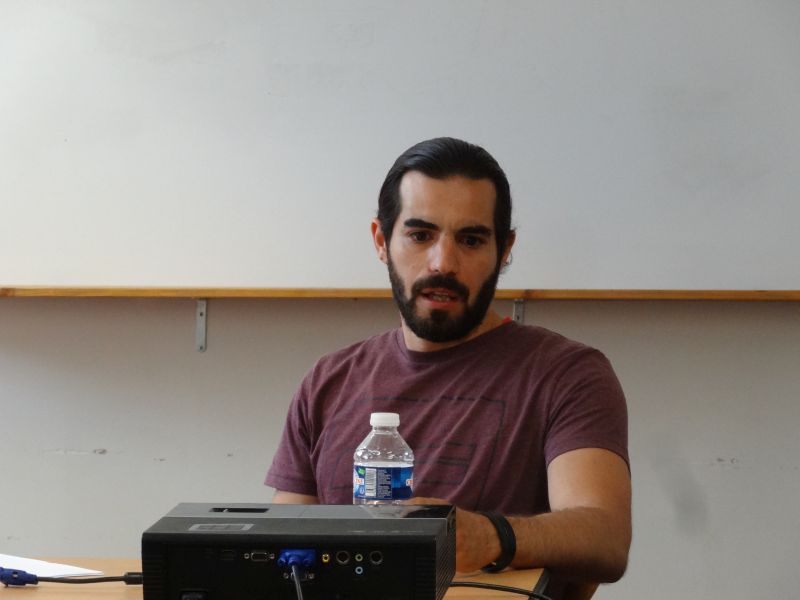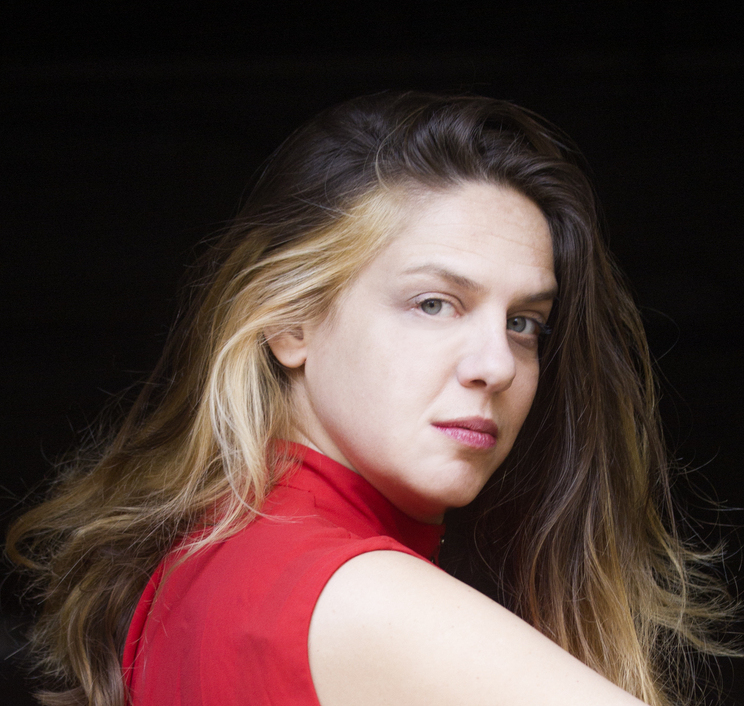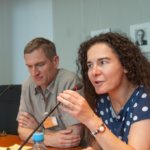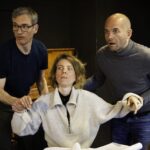Quantum leap in theatre translation
Theatre plays for a largely German speaking audience are not necessarily written in German anymore. Experienced playwrights from other language regions arrive here together with their stories, to live in Germany. Two examples of already renowned playwrights: the Syrian Mohammad Al-Attar, whose play WHILE WE ARE WAITING was invited as a production of the Kunstenfestivaldesarts Brussels to Avignon (in 2015), lives in Berlin now. Under most difficult conditions, he produces with his Syrian theatre ensemble whose members are scattered about in Turkey, Damascus and Egypt. Or Peca Stefan, a renowned Romanian playwright, living in Neukölln now. He speaks no German but writes for and produces with ensembles here at the Ballhaus Ost or the Theater Aufbau Kreuzberg.
For a German audience, these people are highly interesting because they can tell stories about pressing issues of the society in Germany. Particularly the stories of being or feeling alien, of departure and arrival, of the familiar and the strange, the yearning for a home country that is no more, require a solid background of experience to draw from. And these stories cannot wait for their artists to acquire the language of their audience.
The Foreign, the Foreign Language, the Familiar
The foreign language is not alien anymore, and what’s foreign is more exciting than the familiar. What’s alien has become familiar to us, while for many coming from foreign environments the familiar to them is far away. Germany has been enriched with new experiences and biographies and demographics that have been missing for so long and that have been kept outside, too. This emulsion finally turns into a solution with non-native speakers in Germany reporting – despite their missing or hardly sufficient language skills – to local audiences about conflicts that belong onto theses stages.
Theatres and literary agencies are frantically looking for new stories while these stories are stored on desks and computers right next door. For the theatres, they are welcome artistic opportunities to attract an audience that didn’t feel represented or at home in these nevertheless public venues. The head of the Théâtre de Liège related how on an open house day of this expressly international theatre, many people didn’t dare to come inside since they did not feel entitled to use this bourgeois institution and to enter this house that had recently been expanded by an excellent, modern annex. As a result, the theatre decided to move the event to the street in the form of a public picnic.
Translators for Texts Written in Germany for German Audiences
How do new playwrights and their texts find access to these houses, how can the audience access their stories? How will theatres and literary agencies even find or read them? Festivals are certainly one option to make unconventional texts visible since they operate off the beaten paths of the seasonal planning of city theatres. However, plenty of important texts does not catch in the social filter of polished doors or chandeliers in shiny foyers but already in the coarse screen of the German language primate.

Translators wish to and must find their ways into this excessively creative pool of stories written for the German stage to do what is theirs: build bridges, dig tunnels, create links between hitherto unlinked dots on the map, even if it’s only the map of a city district. (The most densely lingually layered sociotopes are necessarily to be found in urban areas where the population is dense, multicultural, and multilingual. It is no coincidence that the Endangered Languages Alliance (ELA), a small scientific organisation for the rescue of endangered languages, operates out of New York City where 800 of the world’s 6,000 idioms are spoken.)
Foreign language texts have to struggle hard to make their way via the traditional channels: from agencies to dramaturgy departments to the seasonal schedules and onto the stages. Who possesses the skills to read texts written in Farsi, Turkish, or Arabic, who speaks the Moroccan dialect? In some fortunate cases, these playwrights may find their way into writing workshops.
The Translation as the Original
Sivan Ben Yishai’s text YOUR VERY OWN DOUBLE CRISIS CLUB, selected for the Autorentheatertage Festival 2017 at the Deutsches Theater in Berlin, is a perfect example of texts that were created in such a manner. The playwright decided for various reasons that she didn’t want to write in her native Hebrew. The festival’s rules clearly state that they will not accept texts written in a foreign language. As a German text, however, the jury found the play so convincing that it won a production there. Hopefully, the application rules will be adapted to the changed situation in the German language region.

The industry by all means has to rethink their ways of operating. How will we get a hold of the exciting texts and stories that are not written in German? Who is going to find and read those stories and pass them on?
More authorship for translators
For the qualified translators needed at these interfaces, the requirements lying in front of them differ from those usually asked for in theatre translation. Their task of providing access exceeds the mere translation of plays that gained recognition abroad, or the creation of supertitles for existing foreign productions. They will have to collaborate closely with the playwrights and will be involved in artistic and conceptual decisions that otherwise wouldn’t be part of their responsibility. In the end, as in the case of Ben Yishai, the translated, redacted, discussed, amended, and mutually edited German text may become the original.
The challenges become particularly complex whenever the language itself becomes the subject matter of the creation. For many migrated playwrights or those whose parents or even grandparents have migrated, the question of communication is an existential reality of everyday life that will appear as such in their texts. The fact of them speaking another language is not a reason for exclusion but remains the prerequisite for their stories to be told. Maybe their texts are or will be multilingual like in the case of NO REVOLUTION(S), a text written by German playwright Ulrike Syha and her Portuguese colleague Mickael de Oliveira that is performed in German, French and Portuguese (Ballhaus Ost 2016, directed by Anne Monfort). In any case of this kind of collaboration the degree of authorship of the translators in the play increases.
New Integration of Wealth in Languages
This development is inevitable for the playwrights community and thus for that of the translators as well. The multilingual landscape grows richer, the creative output in various languages in the German language region is increasing and so is the demand for translations in more languages, for now primarily in languages like Arabic, Turkish, and Farsi. For now, we can only guess what kinds of language developments the future will bring. One thing is certain: the traditional road to bring plays to the stage – from playwrights via agencies to theatres – will break up and theatre institutions – literary agencies, theatres, associations and organisations – will have to open up to texts in other languages. They will have to read texts in a different way and be prepared to read other texts and revise their position towards foreign language texts in general. It immediately follows that the collaboration and communication with theatre translators need to be intensified. The entire theatre industry is shifting because these works demand space. International theatre translators associations like Drama Panorama, TinT in the USA, Eurodram or playwrights associations like The Fence demand and support the integration of theatre translators into the operational processes in theatre and writing workshops similar to or together with the playwrights. Funding programmes need to recognise these aspects more and support playwright-translator tandems, for example, or residencies at theatres that create the working conditions for this situation in the first place.
Original German version first published on nachtkritik.de in 2017.





Leave a Reply